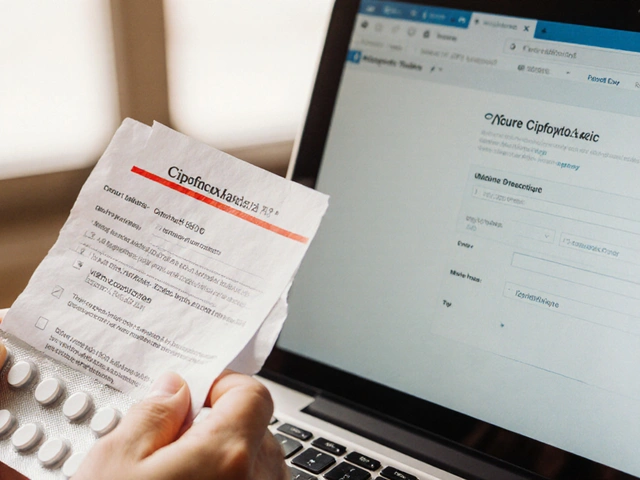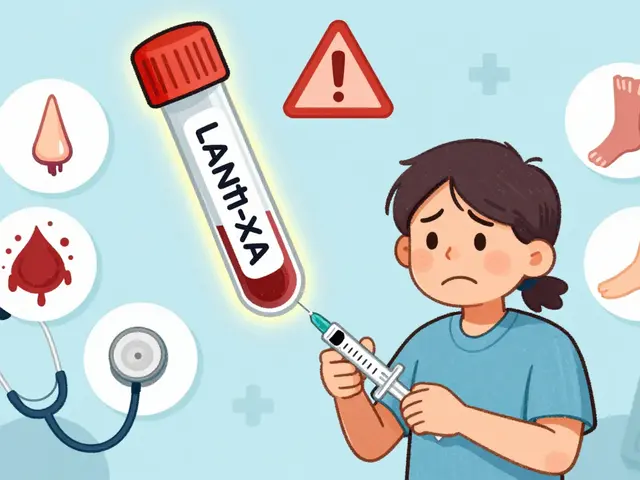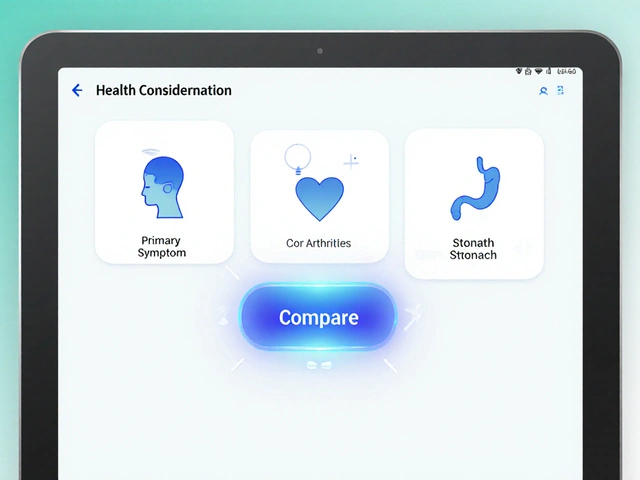Why Some People Look Beyond Synthroid for Hypothyroidism
Ever get the feeling your thyroid meds just aren’t doing enough? You’re not alone. Thyroid issues mess with everything from energy levels to mood, weight, and even memory. The most prescribed medication for hypothyroidism is Synthroid (levothyroxine), a synthetic version of the T4 thyroid hormone. It works for a lot of folks, but not everyone feels like themselves on Synthroid—even if their lab tests say they’re “in range.” That’s when people, like my stubborn son Barnaby's high school science teacher, start asking about alternatives.
Hypothyroidism means your thyroid isn’t making enough hormones. Normally, your thyroid churns out mostly T4, which your body turns into T3, the more “active” hormone. Synthroid gives you T4, banking on your body to convert it. But here’s an annoying twist: not everyone efficiently makes that leap from T4 to T3. Some people feel sluggish or foggy, even though their TSH (thyroid stimulating hormone) looks fine on paper. For them, natural thyroid options—like desiccated thyroid or custom T4/T3 blends—start sounding interesting.
You’ll hear stories online that run the gamut: someone finally shakes off chronic fatigue with a tweak to their med, while another goes from jittery to feeling “human” again by switching up their therapy. Is it hype, or is there really science behind these alternative approaches? Digging into this is a game-changer—especially since getting the right balance can impact pretty much every system in your body. Your hair, weight, stamina, even how much you yell at the kids during homework time. So, what are the main natural thyroid options people turn to when Synthroid isn’t cutting it?
Desiccated Thyroid: What It Is and Why Some People Swear By It
Desiccated thyroid is a medicine made from dried pig thyroid glands. Not exactly dinner-table conversation, right? But it’s been around way longer than Synthroid—since the late 1800s, in fact. You might know it by older brand names like Armour Thyroid, NP Thyroid, or Nature-Throid. It’s considered a “natural” option because it comes from animal sources instead of being made in a laboratory. Most importantly, desiccated thyroid contains a combination of T4 and T3, along with smaller amounts of other thyroid hormones, like T2 and calcitonin.
Why does this matter? Some users feel better with a treatment that gives them both key hormones, not just T4. Research from the past decade—including a notable 2013 trial out of Walter Reed—showed that some people felt their symptoms improved more on desiccated thyroid versus Synthroid, and a fair chunk of patients actually preferred the natural route. That being said, not everyone tolerates it well, and dosing can be tricky because the amount of T3 is proportionally higher, making it strong for those sensitive to it. Too much T3 can cause anxiety, heart palpitations, or even bone thinning if you’re not careful. My neighbor, for example, felt awesome energy for a week, then suddenly couldn’t sleep for two nights straight. It’s about balance—sometimes the answer is tweaking the dose, not just switching brands.
Another weird quirk: because desiccated thyroid is pig-derived, it can have slight natural batch-to-batch differences. The FDA keeps a close watch, but some users have noticed changes in how they feel after pharmacies switched suppliers. And if you don’t eat pork for religious or other reasons, this medicine is obviously off the table for you. There’s also the cost factor. Insurance coverage varies widely, and some plans balk at paying for “natural” versions when cheap generics like levothyroxine are available.
- Pros: Contains both T4 and T3, some people feel better on it, long track record.
- Cons: Dose isn’t customizable, possible supply issues, not vegan/vegetarian, may cause high T3 symptoms.
In short, desiccated thyroid isn’t everyone’s magic bullet, but it’s definitely worth a conversation with your doctor if Synthroid isn't solving your symptoms or if you want to see if a broader spectrum of hormones feels different in your body.

Compounded T4/T3 Blends: Customizing Your Thyroid Therapy
Here’s where things get pretty interesting. Compounded T4/T3 blends allow for a more individualized approach. With these, a compounding pharmacy mixes exact doses of synthetic T4 and T3 tailored for you—none of that pig-thyroid variable business, and you can decide exactly how much of each hormone you get. This really comes in handy if your endocrinologist suspects you’re not converting T4 to T3 efficiently or you fall into the “I feel awful on T4-only meds” camp.
Some of the most common blend ratios are 4:1 (T4:T3), 10:1, or even 20:1, depending on your test results and symptoms. Because everyone’s thyroid journey is so different, some people need more T3 to get out of bed and think straight, especially if genetics or certain health conditions slow their body’s conversion. You’ve probably seen families where one sibling bounces off the walls, and the other can’t get off the couch—thyroid response can be just as personal.
Getting the dose right matters more than you might think. Too much T3 and your heart races; too little and you might feel like a zombie. T3 is much more potent than T4—it kicks in quick and clears from your body faster, which means timing and splitting doses can help smooth things out. Some people take their T3 twice a day to avoid peaks and crashes. And if you have cardiac risk factors, your doctor will be extra careful introducing T3 due to possible side effects.
Compounded meds aren’t regulated as tightly as big-name pharmaceuticals like Synthroid, but pharmacies that follow good manufacturing practices have solid track records. It’s smart to stick to highly-rated compounding pharmacies and let your doctor monitor you regularly—repeat lab tests, watch for weird side effects, and keep checking in about symptoms.
Curious how compounded T4/T3 blends compare to other alternatives? There's a handy breakdown at alternatives to Synthroid that can help you size up your options.
- Pros: Fully customized dosing, plant-derived and synthetic options, great for T4-to-T3 conversion issues, vegan-friendly.
- Cons: Requires regular monitoring, can be pricey without insurance coverage, pharmacy quality matters a lot.
Some people who finally found their best health on compounded meds say it felt like “flipping a switch”—brain fog clearing, aches fading, and finally having the energy for a post-dinner bike ride (Barnaby, take note).
Tips for Talking to Your Doctor About Natural Thyroid Options
So, what’s next if you want to explore natural thyroid solutions or customized T4/T3? First off, walk in prepared. Print out your full symptom list—energy, moods, mental sharpness, even things like dry skin and constipation. Weird symptoms matter: I once heard about a patient who only realized their thyroid dose was off when their eyebrows started disappearing. Don’t be shy about bringing in research; responsible doctors don’t mind seeing reputable studies or real patient stories. It shows you’re invested in feeling your best, not just chasing trends.
Ask your doctor if you’re a candidate for a trial of desiccated thyroid or a compounded blend. Docs usually consider these options for folks who haven’t responded well to Synthroid alone—so highlight your unresolved symptoms. Bring up any family or personal history of heart disease, as T3-heavy therapies need extra caution there. If your insurance plan stinks at reimbursing compounded scripts, ask your doctor for help with *prior authorizations* or look for online compounding pharmacies with good reputations. Sometimes the new dose you need is just a conversation away.
One pro-tip: get your labs done at the same time of day and under similar conditions every time. T3 spikes quickly, so if you took your pill an hour before your blood test, it could skew the results. Your doc might recommend checking free T3, free T4, and TSH every few months until things stabilize, then once or twice a year.
- Track your pulse, blood pressure, mood, and sleep. It helps spot trends early.
- Consider using a daily symptom tracker app.
- Don’t self-adjust your dose—run any changes past your provider.
- Look out for side effects, especially high heart rate, new anxiety, or sleep trouble.
- Ask your pharmacy about their compounding process and certifications.
And, honestly, sometimes you need to shop around for a provider who gets you. Not every doc is open-minded about therapies beyond synthetics, but more are coming around as patients demand options that fit their real-world experience.
If you’re raising a family like me, you know how much being too tired to parent can suck the joy out of life. When your thyroid treatment fits right, everything else—from making dinner to surviving parent–teacher conferences—gets just a bit easier. Getting your thyroid right is worth it, and you’ve got options.







josh Furley
May 4, 2025 AT 13:14 PMJust because something’s “natural” doesn’t magically fix every thyroid quirk 🤷♂️💊.
Jacob Smith
May 9, 2025 AT 20:49 PMHey, don’t let that discourage ya-track those symptoms, tweak the dose, and you’ll crush that fatigue! Keep pushin’.
Chris Atchot
May 15, 2025 AT 04:24 AMFirst, let’s recognize that thyroid management is a nuanced field; more than just “T4 vs T3.” Second, the article correctly outlines the historical use of desiccated thyroid, yet it omits the variability in hormone potency between batches-a point often overlooked. Third, compounded blends offer precision, but the lack of FDA oversight necessitates diligent pharmacy selection; consequently, patients should demand transparent compounding records. Fourth, regular monitoring of free T3, free T4, and TSH remains indispensable, especially when introducing T3‑containing preparations. Finally, communication with your endocrinologist is key-never self‑adjust dosages without professional guidance.
Shanmugapriya Viswanathan
May 20, 2025 AT 11:58 AMOur bodies aren’t labs; the pig‑thyroid thing is just western “one size fits all” nonsense 😤.
Rhonda Ackley
May 25, 2025 AT 19:33 PMI’ve read countless threads where people gush about “miracle” thyroid pills, only to discover they’re chasing a phantom. The truth is, many of us are stuck in a cycle of hope and disappointment, hopping from Synthroid to Armour Thyroid like it’s a Netflix binge. One moment you’re buzzing with energy, the next you’re sleepless, heart racing, and wondering why you even bother. It’s not just about hormone levels; it’s about the hidden costs-financial, emotional, and sometimes even relational. My cousin tried desiccated thyroid, felt a surge for three days, then spent a week in the bathroom thanks to diarrhea. A colleague switched to a compounded blend, paid three times his insurance deductible, and still complained of jittery hands at work. The pharmacy that made the blend changed its formulation overnight, leaving him guessing why his labs spiked. Meanwhile, the “natural” label is used as a marketing ploy, not a guarantee of safety. Doctors often shrug, citing “patient preference,” while the underlying science is buried behind paywalls. I’ve seen patients describe their lives as a roller coaster, screaming for stability while the medication manufacturers adjust doses like a game of roulette. The emotional toll of constantly adjusting, tracking, and arguing with healthcare providers is real; it’s not just a “phase.” Even the most supportive spouse can become weary after months of hearing the same complaints about foggy brain and aching joints. And let’s not forget the cultural stigma-some families dismiss alternative therapies outright, labeling them as “quackery.” Yet, the data from that Walter Reed trial, while modest, does suggest a subset of patients feel genuinely better on broader‑spectrum hormones. So, before we all jump on the bandwagon, let’s remember that each thyroid journey is a marathon, not a sprint, and the path to equilibrium is often paved with trial, error, and a lot of patience.
Sönke Peters
May 31, 2025 AT 03:08 AMSounds like a solid rundown-definitely something to bring up at the next appointment.
Paul Koumah
June 5, 2025 AT 10:42 AMSure, just swap pills and hope magic happens.
Erica Dello
June 10, 2025 AT 18:17 PMLook the data shows desiccated thyroid works for some people but not everyone 🤔 the variability in hormone content can be a problem the best approach is a personalized trial with close monitoring 🌟
sara vargas martinez
June 16, 2025 AT 01:51 AMWhen you examine the pharmacokinetics of T3 versus T4, you’ll notice that T3 has a half‑life of roughly 24 hours compared to the 7‑day half‑life of T4, which means dosing frequency and timing become crucial factors in achieving steady‑state levels; moreover, the peripheral conversion of T4 to T3 is mediated by deiodinase enzymes that are influenced by a host of variables including selenium status, cortisol levels, and even inflammatory cytokines, so a patient’s overall metabolic milieu can drastically alter the efficacy of a pure T4 regimen, thereby justifying the occasional need for combined therapy.
Todd Anderson
June 21, 2025 AT 09:26 AMOne might argue that the very notion of “personalized” therapy is a veneer for pharmaceutical profit; nevertheless, respecting the physiological intricacies you described is a matter of scientific duty rather than nationalist rhetoric.
Dexter Smith
June 26, 2025 AT 17:01 PMThe market pushes “natural” labels to capitalize on fear, yet the evidence base remains thin; cautious, data‑driven decisions are essential.
Cherish Capps
July 2, 2025 AT 00:35 AMHey all, just wanted to say dont forget to log your daily mood and energy, it really helps the doc see patterns.
Amy Carpenetti
July 7, 2025 AT 08:10 AMThat’s a good tip it keeps things simple and honest.
Paul Griffin
July 12, 2025 AT 15:45 PMMaintaining open communication with your healthcare provider fosters trust and optimizes therapeutic outcomes.
Michael Tekely
July 17, 2025 AT 23:19 PMYo, keep that feedback loop tight-symptom tracking, dose tweaks, and lab checks are the three pillars of thyroid mastery.
Oscar Taveras
July 23, 2025 AT 06:54 AMStay hopeful, the right regimen can transform daily life for the better :)
katie clark
July 28, 2025 AT 14:29 PMIndeed, the nuanced interplay of endocrine pharmacodynamics warrants a sophisticated, scholarly discourse.
Carissa Engle
August 2, 2025 AT 22:03 PMIt is utterly disappointing how many claim miracle cures without any rigorous trials the enthusiasm for unregulated compounds often masks a deeper desperation for quick fixes the medical community repeatedly warns about the risks of unsupervised T3 dosing which can precipitate arrhythmias and bone loss yet the hype persists unchecked the financial burden on patients flirts with exploitation the psychological impact of constant symptom watching can erode confidence the narrative of “natural” superiority is a marketing construct not a scientific truth finally, a balanced approach anchored in evidence and professional oversight remains the only sustainable path
Dervla Rooney
August 8, 2025 AT 05:38 AMI understand the concerns you raise; ensuring patient safety while respecting individual experiences is a delicate balance.
Johnny Ha
August 13, 2025 AT 13:13 PMAll these “big pharma” studies are just a front to keep us dependent on synthetic pills.